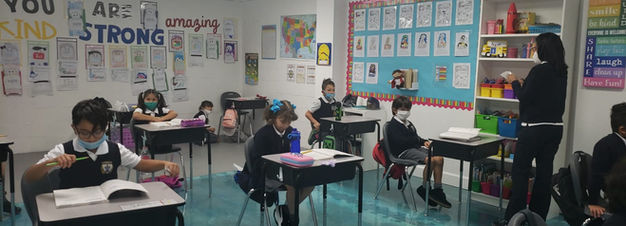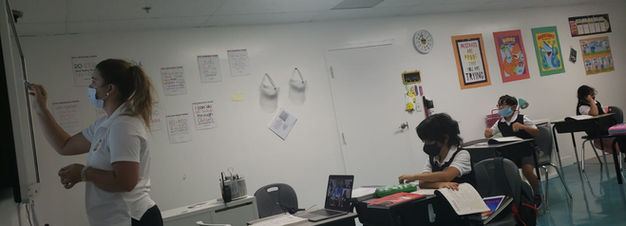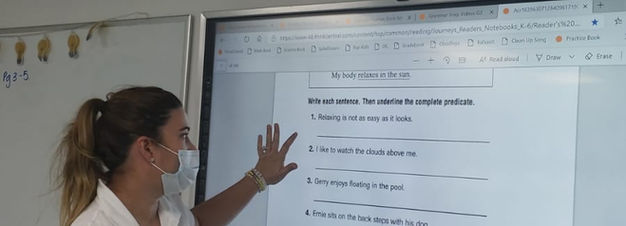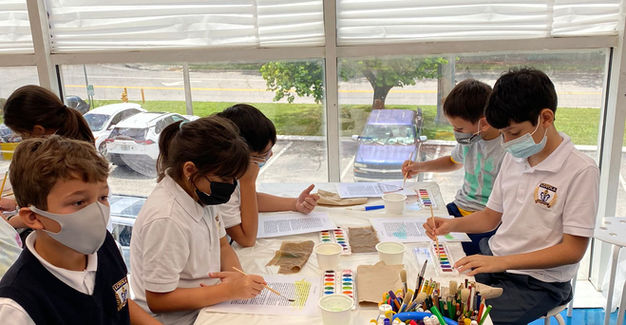
ELEMENTARY
Your option on Bilingual Educational Excellence
Financial Aid Available
Our Program
Ignatian Pedagogy embodies five key teaching elements
Context, Experience, Reflection, Action, and Evaluation.
Context - What needs to be known about learners (their environment, background, community, and potential) to teach them well?
Cura Personalis--personal care and concern for the individual--is a hallmark of Jesuit education and requires that teachers become as conversant as possible with the context or life experience of the learner. Since human experience, always the starting point in a Jesuit education never occurs in a vacuum, educators must know as much as possible about the actual context within which teaching and learning take place. Teachers need to understand the world of the learner, including the ways in which family, friends, peers, and the larger society impact that world and affect the learner for better or worse.
Experience - What is the best way to engage learners as whole persons in the teaching and learning process?
Teachers must create the conditions whereby learners gather and recollect the material of their own experience in order to instill what they understand already in terms of facts, feelings, values, insights, and intuitions they bring to the subject matter at hand. Teachers later guide the learners in assimilating new information and further experience so that their knowledge will grow in completeness and truth.
Reflection - How may learners become more reflective so they more deeply
understand what they have learned
Teachers lay the foundations for learning how to learn by engaging students in skills and techniques of reflection. Here memory, understanding, imagination, and feelings are used to grasp the essential meaning and value of what is being studied, to discover its relationship to other facets of human knowledge and activity, and to appreciate its implications in the continuing search for truth.
Action - How do we compel learners to move beyond knowledge to action?
Teachers provide opportunities that will challenge the imagination and exercise the will of the learners to choose the best possible course of action from what they have learned. What they do as a result under the teacher's direction, while it may not immediately transform the world into a global community of justice, peace and love, should at least be an educational step towards that goal even if it merely leads to new experiences, further reflections and consequent actions within the subject area under consideration.
Evaluation - How do we assess learners growth in mind, heart, and spirit?
Daily quizzes, weekly or monthly tests, and semester examinations are familiar instruments to assess the degree of mastery of knowledge and skills achieved. Ignatian pedagogy, however, aims at evaluation which includes but goes beyond academic mastery to the learner's well-rounded growth as persons for others. Observant teachers will perceive indications of growth or lack of growth in class discussions and students' generosity in response to common needs much more frequently.
1
Planning experiences that will challenge the students to reach a superior level of knowledge.
2
Promoting the natural interaction among children.
3
Creating a supportive social climate with the parents by involving them with the program.
We constantly strive to raise the bar in our student's development by following and reinforcing our philosophy, which focuses on building your child's social and emotional character with self-confidence skills while acquiring and enhancing the four basic areas of development: cognitive, socio-emotional, psychomotor, and language.
We believe that children construct their own knowledge with their personal initiative and the use of key experiences. Promoting children's mental, emotional, social and physical growth is vital to help them interact with people, materials, and ideas. We also include other key elements to ensure the development of the whole child (CURA PERSONALIS) such as Music, Art, Science, Engineering and Indoor Sports.
Kinder
Our kinder students enter their first year of elementary school with expert teachers. We allow them to truly explore their opportunities by opening their mind to new ideas and knowledge. They might be young but our teachers strive to challenge them academically.
First Grade
First grade is a fundamental year for students. They reinforce their reading skills and build on essential skills for their future education. The goal is for them to prepare for the upcoming challenges in the next grades.
Second Grade
Second grade is not easy but it is possible with our amazing teachers. All our second-grade students work on becoming important young men and women. They excel with their academic skills while boosting their creativity.
Third Grade
Third Grade is a year of great academic growth. They start to shift to more complicated topic in math such as advanced multiplication and division. In reading it's time to move on from learning to read to reading to learn.
Fourth Grade
Our superstars in Fourth Grade lead our Elementary school. We add a new grade every year, making sure we keep our curriculum up to date and challenging. Our goal is to provide them with an excellent education that also incorporates the arts, entrepreneurship, critical thinking, and more.












































